- Home
- Jacqueline Wilson
Rapunzel
Rapunzel Read online
Cover
About the Book
Title Page
Jacqueline Wilson
Rapunzel
About the Author
Copyright
About the Book
When Rapunzel is banished to a tall tower in the middle of the woods, escape seems impossible. Can she use her long locks to escape from her evil stepmother and find her prince?
This story is a magic bean. It may not look much like a bean, but I can promise you that it is. For if you plant it in a young mind, it will grow into a love of story and reading. These beans are favourite fairytales and legends that will delight, thrill and thoroughly entertain. Each story has been brilliantly crafted by one of the best-loved writers for children. How many magic beans have you read?
Jacqueline Wilson
RAPUNZEL
A Magic Beans Story
Rapunzel
Retold by Jacqueline Wilson
Illustrated by Nick Sharratt
THERE WAS ONCE a husband and wife who longed for a child. The man made a cradle out of oak and carved buttercups and daisies round the side. The woman sewed many silk outfits and embroidered flocks of lovebirds and butterflies on every single baby garment.
The years went by. The cradle gathered dust in a corner because the woman couldn’t bear to go near it. The baby clothes stayed shut in a drawer, the bright birds and butterflies trapped in the dark.
The husband hoped his wife might accept her lot as she grew older but if anything her longing grew worse. Sometimes he saw her fold her arms and rock them as if she were holding an invisible baby. He couldn’t stand seeing her aching so badly.
The couple lived in a cottage at the edge of the village. The very last house was a forbidding dark dwelling with dragons painted on the door and a glowering griffin weathervane on the roof. The garden was surrounded by a high wall but the husband and wife could peep down into it when they were upstairs in their cottage.
It was no ordinary garden of cornflowers and cabbages. They recognized some of the plants, lavender, mint, camomile, foxglove … but there were many strange herbs they’d never seen before.
They rarely spied their neighbour, a wild-looking old woman with tangled grey hair and stark black clothing. She sold herbal remedies and acted as a midwife – but most of the villagers shunned her, whispering that she was a witch. One stupid small boy dared torment her, climbing her wall and pulling up some of her plants. That night he had a fit, fell into a trance, and never walked or talked again.
The husband and wife steered well clear of their neighbour – but the husband couldn’t help wondering if she might have some magic potion that could help them have a child. She was a midwife, after all. She might know some special secrets.
One morning the wife discovered a strand of grey in her fair hair. She started weeping because she knew she was almost too old to have a baby now. The sound of her sobs spurred the husband on.
He walked out of the cottage, down the garden path, out of his wooden gate – and through the sharply spiked iron arch belonging to his neighbour. He stood still in the strange garden, staring all around him. The cobbled path seemed to tilt first one way, then the other, making him dizzy. He forced himself towards the house, plants brushing against his ankles with their bristly leaves, creepers coiling round his calves as if they had a life of their own.
It took him all his courage to seize the leering lion’s-head knocker. It was horribly hot to the touch so that he only dared one timid rap before snatching his hand away. The door opened almost immediately. The bent old woman stood before him, squinting up at him from behind her grey hanks of hair.
‘I’m so sorry to disturb you, Madam,’ the husband said. ‘It’s just that I couldn’t help wondering … You seem so learned in matters of magic …’ His voice tailed away.
The old woman waited, rubbing her dry old hands together so that they made a rasping noise.
‘It’s my wife,’ the husband continued desperately. ‘She’s always longed for a child and now I’m so scared this longing is driving her demented. Is there any way at all you can help? Some pill, some potion, some secret spell? I’m not a rich man but I’d be willing to give you all my savings – a purse of gold – if you will help us.’
The old woman’s mouth tightened until her dry lips disappeared.
‘I have always longed for a daughter myself,’ she said, her old eyes watering.
The husband stared at her in astonishment, amazed that a weird old witch woman could want a child.
‘Do not look so surprised,’ she said bitterly. She sniffed and composed herself. ‘However, you have been courteous. I do know a few secret tricks that might work.’ She whispered in his ear. ‘And make your wife a special rapunzel salad tonight.’
‘Rapunzel?’ said the husband.
‘You might call it rampion. It’s a salad delicacy.’
‘We haven’t got any rampion in our vegetable garden. Would lettuce do instead?’ said the husband.
‘It won’t do at all,’ said the old woman. ‘Here, I have a special rampion patch myself. I will pick you a bunch. But I can only spare you a little.’
‘It’s very kind of you to spare me any,’ said the husband gratefully. ‘What do I owe you?’ He rather hoped she wasn’t going to charge him too many pieces of gold for a couple of tips and a bunch of green leaves.
‘You don’t owe me anything, neighbour. But do not come back and trouble me again,’ said the old woman, and she shut her door.
The husband went back to his wife and told her he’d consulted with the old woman. She was impressed by his courage, but did not think the witch’s tricks would work – though she ate all her rampion salad supper with great relish.
Weeks passed. The husband and wife dared start hoping. Months passed. The wife’s gown grew tight around her waist. She clasped her rounded stomach, her face soft with joy.
‘I am going to have a baby!’ she said.
The husband put his arms around his dear wife and they both wept with happiness.
The wife was not very well during the months she carried her child. She had to rest in her bed many days and she was often sick.
‘You must eat something, my love. You have to nourish our baby as well as yourself,’ said the husband.
‘I can’t fancy any food at all – except that strange rampion,’ said the wife. ‘Oh, I so long for that sweet delicious fresh tangy taste. Can’t you ask the old witch for some more?’
‘She said she could only spare me a little. And she warned me not to trouble her again.’ The husband hesitated. ‘But I could try telling her just how much it would mean to you.’
So he went round to the old woman. She glared at him when she opened her door. He told her his wife was now with child and begged for another bunch of rampion.
‘I told you, I cannot spare you any more.’
‘She craves the taste so.’
‘Then she must go on craving,’ said the old woman sharply. ‘I’m warning you! You will bitterly regret it if you disturb me again.’
The wife wept when told of the old woman’s refusal. She sat up in bed all day and half the night, looking down into the garden where she could see the green rampion patch. Her stomach was still round, but her face grew pale and pinched and the flesh fell away from her arms and legs. The husband was tormented with this new worry, scared his wife would not survive her pregnancy.
He knew there was no point begging the old woman once more. He decided to take matters into his own hands. He knew what he had to do.
He waited until long past midnight when the moon was hidden by clouds. Then he crept out of his house in his stockinged feet. The iron arch was locked but he climbed up and over it, though hidden spikes tore great grooves in hi
s hands. He sucked his bloody fingers and stumbled up and down the cobbled path, trying to locate the rampion patch. A huge creeper wound itself right round his neck like a cobra and gave him such a shock he fell headlong. He lay stunned for a moment – and then realized he had fallen right into the rampion patch.
He plucked as many leaves as he could, scrambled to his feet, and was just stumbling back to the gate when he heard the front door open.
The moon came out, a huge pearly full moon that cast an eerie silver glow upon the garden. The old woman stood right in front of him, her eyes glittering, her face contorted, her mouth open. Her few teeth were filed into points. She looked as if she could tear out his throat with one bite.
‘How dare you steal from me!’ she shrieked.
‘Oh please, have mercy! I know I shouldn’t have tried – but my wife is so ill and craves your rampion so very badly, you have no idea.’
‘Yes, I have no idea,’ said the old woman, hugging her bent old body tight with her crooked hands.
‘Can’t you take pity on us?’ the husband begged. ‘If my wife cannot eat your rampion she will surely die.’
The old woman said nothing for a long, long while. A little trickle of saliva slid from between her pointed teeth and dribbled down her chin. Her eyes gleamed like a wild cat’s. The husband wondered whether to try to make a run for it but his sodden feet seemed planted in her garden and he could scarcely move a muscle. He realized he was under a terrible enchantment.
‘Please, I beg you, have mercy!’ he gasped. ‘I will do anything, give you anything, if you will let me go back to my wife.’
‘Anything at all?’ said the old woman.
‘Anything at all,’ the husband repeated desperately. ‘I swear it.’
‘Then your wife shall have all the rampion she can eat,’ said the old woman, stooping down and gathering great fistfuls of it. She thrust them at the husband, who found he could wrench his feet free again. ‘But, in return …’
He waited, heart thudding.
The old woman raised her head and pointed a shaking finger.
‘In return … If your wife has a daughter you must give the child to me.’
The husband gasped and implored but the old woman turned her back on him and shut herself into her dark house.
He took the rampion back to his ailing wife. She seized it joyously, eating it straight from his hand, not even bothering to wash the earth away.
‘Thank the Lord the old witch didn’t catch you!’ she said.
The husband didn’t dare tell her what had happened. He could not stand to worry her so. Besides, they might well have a son.
He consulted all the other old women in the village to see if they had any way of divining the sex of the unborn child. His wife laughed as they dandled rings on ribbons above her swollen stomach.
‘I don’t care whether our baby is a boy or a girl,’ she said.
‘I care,’ said the husband. He shut his eyes as if he were praying. ‘It has to be a boy.’
‘It will be a boy,’ cried the old women as the ring swung backwards and forwards.
‘A baby boy,’ said the wife, and she sounded pleased.
She looked so much better, a pink flush to her cheek. She bloomed throughout the rest of her pregnancy like a sweet round peach. The husband grew thin and pale with dread.
‘It has to be a boy,’ he muttered, his hands on the wife’s stomach.
He could feel the baby kicking within.
‘My son,’ he whispered.
‘Our son,’ said the wife.
But it wasn’t a son. The wife had an easy labour and gave birth to a beautiful blonde daughter.
‘A girl!’ said the husband, and burst into tears.
‘Our daughter,’ said the wife.
‘My daughter,’ said the old witch-woman, suddenly appearing in the room as if she had leaped through the window. She seized hold of the newborn child, still pink and naked, and held her tight against her sunken chest.
‘No!’ screamed the wife, trying to get out of bed, but stuck fast.
‘No!’ shouted the husband, reaching out his arms, but able to grasp nothing.
‘Yes,’ said the old woman, wrapping the baby in a blanket and cradling her. ‘She is my daughter now and I name her Rapunzel.’ She looked over at the anguished wife. ‘Do not worry, I will be a loving mother to the child.’
‘My child,’ the wife gasped.
‘Mine now,’ said the old woman. ‘But perhaps fate will still be kind to you and grant you another. Eat my rampion whenever you wish. I am going to be far, far away.’
And with that she wrapped her cloak around herself and the child … and vanished.
The old woman set up home in another village the other end of the country. She laid out another elaborate herb garden and sewed it with many seeds – but no rampion. She looked after Rapunzel with loving care, singing to the child at night, telling her magical stories, teaching her the names of all the herbs and how to turn them into potions and remedies. She did not send Rapunzel to the village school when she was five. She taught the child to read and write herself.
The old woman and Rapunzel kept very much to themselves, but as the girl grew older children came calling every day, desperate to see and talk and play with the strange little girl with such old-fashioned sweet manners and such amazing hair. Rapunzel was a bonnie baby and a pretty little girl but by the time she got to eleven it was obvious she was growing into a stunning beauty. She had a lovely face and a lithe form but the most wondrous thing about her was her hair. It was thick and blonde with a natural wave. The old woman washed it with special herbal shampoo and brushed it a hundred strokes each night with an ivory-backed bristle brush. Rapunzel’s hair grew long and strong and shining. It was down past her shoulders by the time she was two, curling at her waist by five, gently brushing the backs of her knees at eight, and now at eleven Rapunzel’s hair swept the floor like a golden train.
Of course this was scarcely practical, so during the day the old woman braided it, her shaking fingers surprisingly nimble as she plaited each heavy silken strand, and then she looped the braids up so that Rapunzel had her own golden halo of hair. It was so heavy on her head that it was always a great relief to untie it all at bedtime. The old woman would sometimes plunge her hands into its warmth or delicately finger one little curl. Once she felt her own sparse grey straggles and sighed.
‘I expect you had long golden hair when you were little, Mother,’ said Rapunzel. ‘But anyway, I think grey hair is very distinguished.’
‘You are a sweet child, daughter,’ said the old woman. ‘You do love me, don’t you, Rapunzel?’
‘More than anyone in the world, Mother,’ said Rapunzel.
‘And you never feel you’d be happier living anywhere else?’
‘I only ever want to live with you,’ said Rapunzel.
There was a knock on the door at that moment. Half a dozen ragged boys from the village had come to call on Rapunzel. The old woman sent them away curtly. A few days later a young nobleman from a nearby castle came to see this girl with the wondrous hair for himself. The old woman sent him away with equal abruptness. The next day three more young men came calling.
‘Do we have to send them all away, Mother?’ said Rapunzel. ‘It might be pleasant to have company from time to time.’
‘We are company. We don’t need anyone else,’ said the old woman gruffly.
The callers became such a problem as Rapunzel’s hair grew to ever more fabulous golden lengths that the old woman became desperate. She worked her magical powers to the ultimate and then woke Rapunzel very early on her twelfth birthday and told her she had an astonishing present for her. She said it was hidden deep in the forest.
‘Why did you hide it away there, Mother?’ asked Rapunzel.
‘So that no one else will see it. It’s our very own special secret,’ said the old woman, taking Rapunzel by the hand.
They walked far into the dark
forest. Rapunzel couldn’t help being a little frightened, especially when an animal snarled in the distance or a bird suddenly soared in the air, almost entangling itself in Rapunzel’s abundant tresses.
‘Are we nearly there, Mother?’
‘Very nearly, my dear,’ said the old woman.
She held Rapunzel’s hand very tightly indeed. The trees suddenly thinned and they stepped into a sunlit round clearing edged by tall protective oaks. Skylarks spiralled high in the air above, squirrels scampered in the grass below. At the very centre of the clearing was a shining golden tower.
Rapunzel stood still, dazzled.
‘What is this beautiful tower, Mother?’
‘It’s a new home, daughter dearest,’ said the old woman.
‘Our new home?’ said Rapunzel.
‘Your new home, Rapunzel,’ said the old woman.
She pointed to the tower. It shone so strongly in the sunlight that Rapunzel had to hide her eyes. The light seared her very eyelids and she had to crouch down, her arms over her head. She seemed to be whirled around, up and up and up … and then suddenly she found herself curled on the floor. She wasn’t lying on the grass in the sunlight. She was crouching on dark red carpet.
Rapunzel lifted her head and stared all around her. She was in a round red chamber, a beautiful room with velvet couches and crimson tapestries and ruby glass lamps. There was a table set with all her favourite dishes, a chest of beautiful dresses all colours of the rainbow, a shelf of all her special childhood toys. There was a bed with a deep rose coverlet and a pink satin pillow, a dressing table set with her own ivory-backed hairbrush.
‘My home?’ Rapunzel whispered. And then she shouted, ‘Mother? Mother, where are you? Mother!’
‘Come to the window, Rapunzel,’ the old woman called.
Rapunzel picked herself up and ran to the one high-up window in the room. She peered down … and there was the old woman far below.

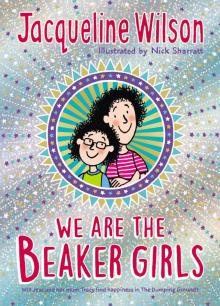 We Are the Beaker Girls
We Are the Beaker Girls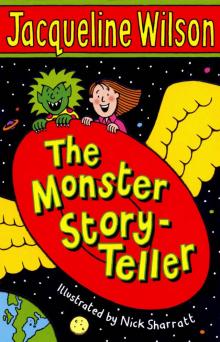 The Monster Story-Teller
The Monster Story-Teller The Worry Website
The Worry Website Girls Under Pressure
Girls Under Pressure Little Darlings
Little Darlings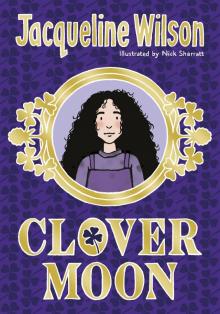 Clover Moon
Clover Moon Paws and Whiskers
Paws and Whiskers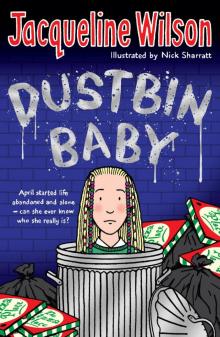 Dustbin Baby
Dustbin Baby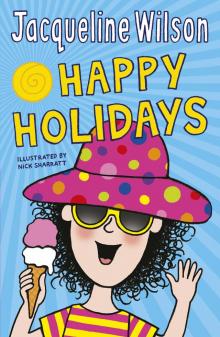 Jacqueline Wilson's Happy Holidays
Jacqueline Wilson's Happy Holidays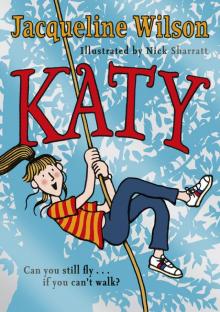 Katy
Katy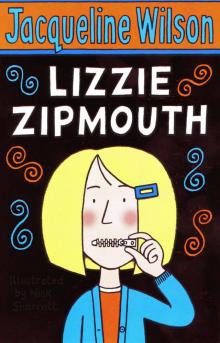 Lizzie Zipmouth
Lizzie Zipmouth Cliffhanger
Cliffhanger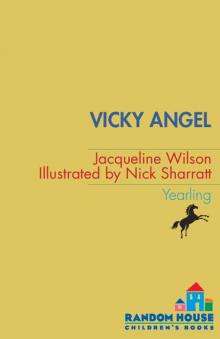 Vicky Angel
Vicky Angel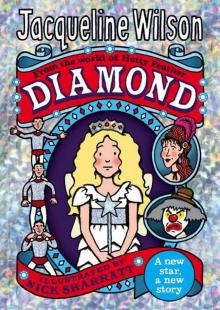 Diamond
Diamond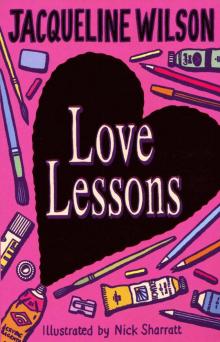 Love Lessons
Love Lessons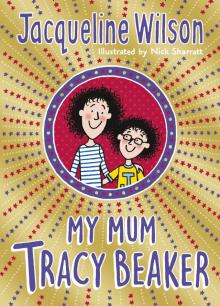 My Mum Tracy Beaker
My Mum Tracy Beaker Lola Rose
Lola Rose Jacky Daydream
Jacky Daydream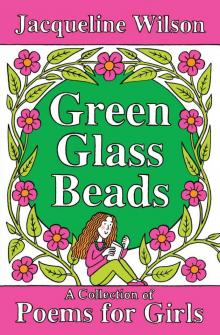 Green Glass Beads
Green Glass Beads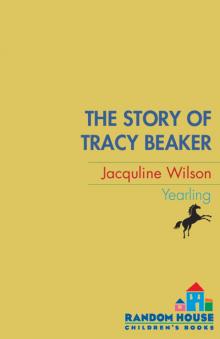 The Story of Tracy Beaker
The Story of Tracy Beaker Clean Break
Clean Break Longest Whale Song
Longest Whale Song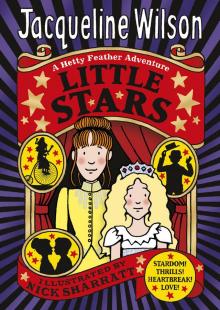 Little Stars
Little Stars Double Act
Double Act The Suitcase Kid
The Suitcase Kid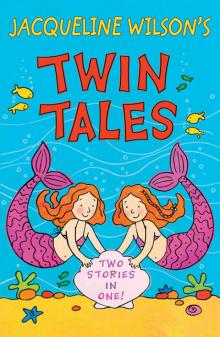 Twin Tales
Twin Tales Girls in Tears
Girls in Tears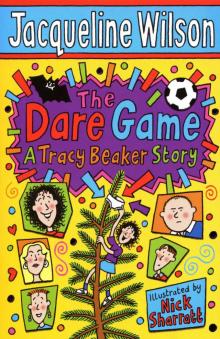 The Dare Game
The Dare Game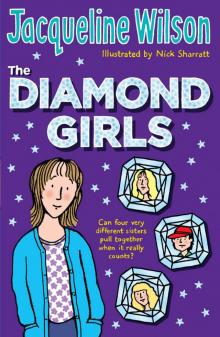 Diamond Girls
Diamond Girls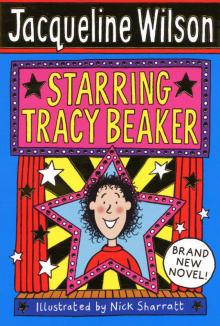 Starring Tracy Beaker
Starring Tracy Beaker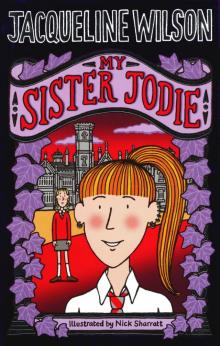 My Sister Jodie
My Sister Jodie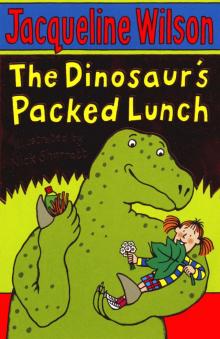 The Dinosaur's Packed Lunch
The Dinosaur's Packed Lunch Candyfloss
Candyfloss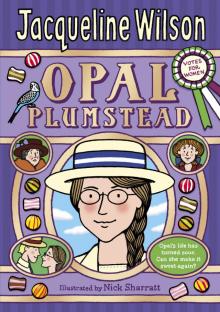 Opal Plumstead
Opal Plumstead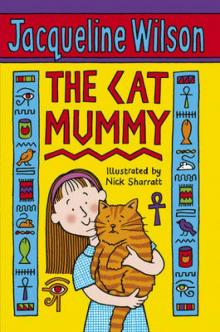 The Cat Mummy
The Cat Mummy Werepuppy and the Werepuppy on Holiday
Werepuppy and the Werepuppy on Holiday Hetty Feather
Hetty Feather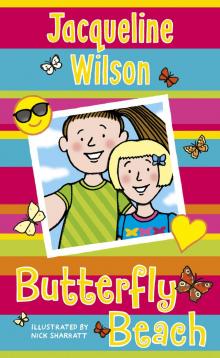 Butterfly Beach
Butterfly Beach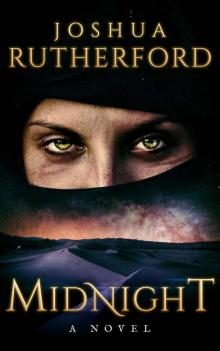 Midnight
Midnight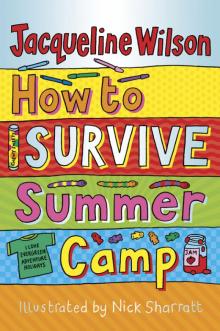 How To Survive Summer Camp (ePub)
How To Survive Summer Camp (ePub) Cookie
Cookie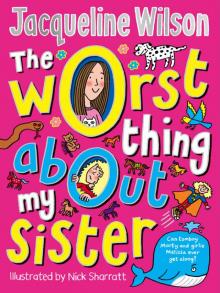 The Worst Thing About My Sister
The Worst Thing About My Sister Bad Girls
Bad Girls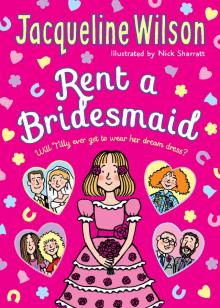 Rent a Bridesmaid
Rent a Bridesmaid Girls in Love
Girls in Love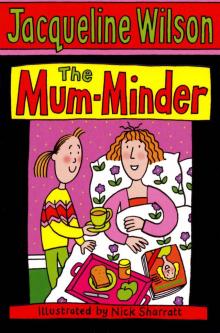 The Mum-Minder
The Mum-Minder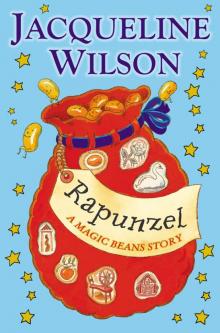 Rapunzel
Rapunzel Lottie Project
Lottie Project Best Friends
Best Friends Video Rose and Mark Spark
Video Rose and Mark Spark Glubbslyme
Glubbslyme Girls Out Late
Girls Out Late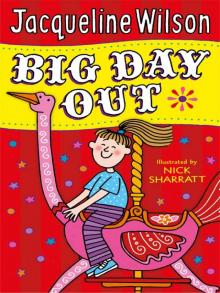 Big Day Out
Big Day Out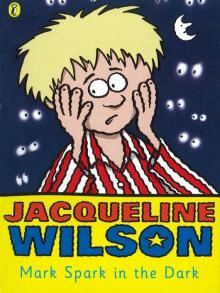 Mark Spark in the Dark
Mark Spark in the Dark Buried Alive!
Buried Alive! Four Children and It
Four Children and It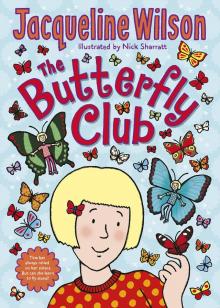 The Butterfly Club
The Butterfly Club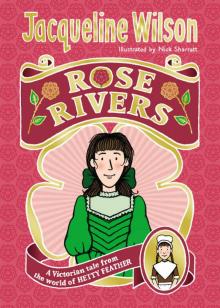 Rose Rivers
Rose Rivers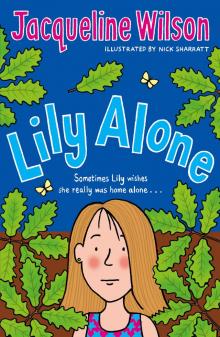 Lily Alone
Lily Alone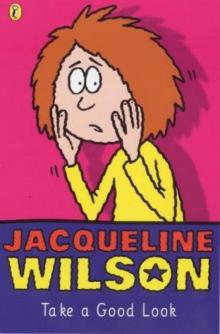 Take a Good Look
Take a Good Look My Secret Diary
My Secret Diary Kiss
Kiss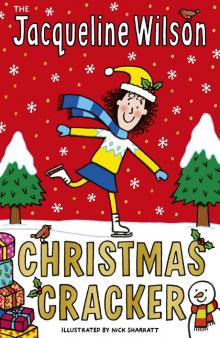 The Jacqueline Wilson Christmas Cracker
The Jacqueline Wilson Christmas Cracker The Worry Web Site
The Worry Web Site Emerald Star (Hetty Feather)
Emerald Star (Hetty Feather) The Bed and Breakfast Star
The Bed and Breakfast Star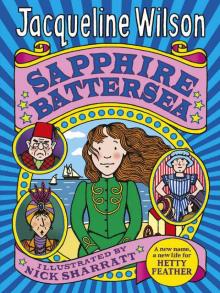 Sapphire Battersea
Sapphire Battersea Cat Mummy
Cat Mummy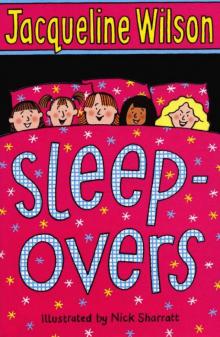 Sleepovers
Sleepovers Dare Game
Dare Game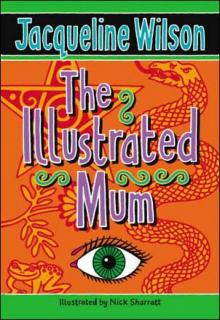 The Illustrated Mum
The Illustrated Mum Secrets
Secrets